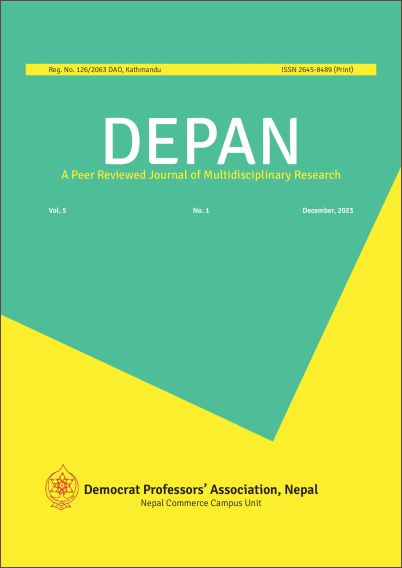Transformation of Deuda Song: Folk to Popular Culture
DOI:
https://doi.org/10.3126/depan.v5i1.74042Keywords:
Deuda, Folk-culture, popular culture, diaspora, community, bonding, globalizationAbstract
This research paper explicates the transformation of Deuda songs from folk culture to pop culture in terms of functions, patterns and purposes over the time. Along with rapid development of transportation, information technology, mass media and movements of people from rural to city specially after the restoration of democracy in Nepal, Deuda, a folk-dance song originated and played in all districts of the far western region and inclusively some areas of Mid-western Nepal, undertakes its journey from village to city. In towns, it enters into the domain of popular culture with recording, visualization and screening. Now, Deuda song has been changed in its patterns in order to draw the attention of larger audience with diverse back grounds. Deuda has not been changed in its physical form only, but it has gone through the changes of its purpose, function and role also. Originally, Deuda served primarily as a means of community bonding, cultural transmission, and local entertainment. But, in the realm of popular culture, Deuda has been sung for earing, entertainment and political propaganda. In this globalized time where the world has become a collective village, national boundaries have been blurred and people from the Deuda regions perform Deuda abroad to reconnect themselves with their origin and culture. In this light, Deuda plays the role of diasporic element also. The present research work exposes the ways folk performances has become popular with economic, social, political and cultural functions. It retraces changes in folk dances when performed in restaurants, bars, colleges along with festivals, locally and abroad
Downloads
Downloads
Published
How to Cite
Issue
Section
License
This license enables reusers to distribute, remix, adapt, and build upon the material in any medium or format, so long as attribution is given to the creator. The license allows for commercial use.




